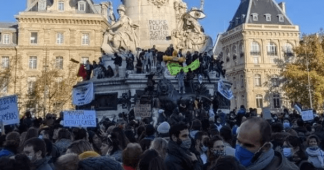By Alex Lantier
Dec. 7, 2020
Eyptian dictator General Abdel Fattah al-Sisi arrived last night in Paris for three days of talks with President Emmanuel Macron and other top French officials. Press statements indicated, in the usual bland language, that Macron and Sisi will discuss strategic issues and what they referred to as Sisi’s “human rights record.”
In plain language, they will discuss their collaboration against Turkey in bloody proxy wars to control Libyan and eastern Mediterranean oil fields, and what has made Sisi infamous around the world—murderous repression of the working class.
In a coup launched in July 2013, Sisi ordered thousands gunned down in the streets, crushing a two-year revolutionary movement of the Egyptian workers. Sisi now rules Egypt through mass arrests and the torture of 60,000 political prisoners. A few officials from the Socialist Party (PS) and Jean-Luc Mélenchon’s Unsubmissive France (LFI), embarrassed by Macron’s ties to Sisi, signed a Le Mondecolumn suggesting he “put human rights at the heart of our bilateral relations” with Egypt.
In fact, Sisi is coming to give Macron a tutorial on how to run a fascistic authoritarian regime, amid mounting social anger at the French president’s police state agenda.
On Saturday, police again brutally attacked tens of thousands of protesters in Paris opposed to Macron’s “global security” bill, a week after 500,000 marched against the law. There is explosive anger at the draft law, one of whose provisions—now being reworked—would ban the filming of police. The United Nations condemned it for allowing “important attacks on human rights and fundamental liberties.”
What this bill would allow emerged clearly in the savage beating of music producer Michel Zecler by police who burst into his Paris home on Nov. 21. The police claimed that Zecler assaulted them and were about to jail him when home video emerged of the incident, exposing all of the police accusations as fabrications. It is clear that, without the right to film police, nothing protects the population from assault and arbitrary imprisonment by the police state on the basis of lies.
On Wednesday, Interior Minister Gérald Darmanin will present a final draft of an “anti-separatist law,” now renamed in Orwellian style the “law to strengthen Republican principles.” In fact, the law gives the state unprecedented powers to regulate religious institutions and dissolve all types of associations—including religious, charitable, legal and political groups—whose rights have, except during the Nazi Occupation of France, been legally guaranteed for over a century.
Darmanin set a far-right tone when he first laid out the law, appealing to anti-Semitic and anti-Muslim sentiments by stating that he did not like supermarket aisles for kosher or halal foods. Since then, the state has closed 76 mosques. It also dissolved several associations, including the Council Against Islamophobia in France, an advocacy group offering legal assistance to Muslims.
Terrified of growing social anger, Macron has demanded that international newspapers censor coverage critical of the law. The Financial Times took down an article on the draft law and published a letter by Macron denouncing its coverage, while the New York Times carried an interview with Macron lecturing its journalists on their “bias” against the law.
Powerful factions of the ruling class believe that protecting their wealth requires the establishment of an authoritarian regime. Two weeks ago, the far-right retired chief of the general staff, General Pierre de Villiers, spoke to the neo-fascist magazine Current Values to stress the need for dictatorship. “The rule of law is obviously a nice thing, but sometimes you also have to think strategically,” he said.
Yesterday, de Villiers gave a two-page interview to Le Parisien, which published it alongside an editorial speculating that he could be “the surprise of the next presidential election.” De Viliers warned of the danger of revolution and the international upsurge of class struggle that unfolded prior to the COVID-19 pandemic. He said, “The social climate was already very degraded before the pandemic. The current climate is at best embittered, at worst explosive, in any case highly unstable. Everywhere, poverty and anger are rising.”
Comparing the situation to the conditions that prevailed before the French Revolution, World War I and the Russian Revolution of October 1917, he added: “Things can change gradually or very quickly, if there is a spark like in 1789 or 1914. France is an old democratic country, a mature country, but it historically has trouble reforming itself. It often happens with explosions, with ruptures.”
“I fear civil war,” de Villiers added, demanding a strengthening of police powers. “Today our police forces are stretched to the breaking point,” he declared. “They are the victims of violence we have not seen since [the French general strike of] May 1968.”
These class tensions are rooted not in French, but global conditions. Billions of people worldwide are cut off from state aid as the economy collapses under the weight of the pandemic, and trillions of euros are being handed over to the banks and major corporations in state bailouts. This criminal policy, following three decades of intensifying austerity across Europe following the Stalinist dissolution of the Soviet Union in 1991, produces levels of social inequality incompatible with democratic rule.
In France—one of Europe’s wealthier countries—nine million people, nearly 15 percent of the population, live under a low poverty threshold of €900 per month. Half of them are youth under 30.
Events in France must be taken as a warning to workers internationally: decisive factions of the ruling class are consciously responding to the threat of revolution by working to establish a fascist police state. Writing in 1929, as the ruling class prepared to hand over power to the fascists in Germany and across Europe, the great Marxist revolutionary Leon Trotsky explained:
“By analogy with electrical engineering, democracy might be defined as a system of safety switches and circuit breakers for protection against currents overloaded by the national or social struggle. No period of human history has been—even remotely—so overcharged with antagonisms as ours. The overloading of lines occurs more and more frequently at different points in the European power grid. Under the impact of class and international contradictions that are too highly charged, the safety switches of democracy either burn out or explode. That is essentially what the short circuiting of dictatorship represents.”
In a passage that could have been addressed to those who think dictatorship cannot spread from Egypt to Europe, Trotsky added: “Gout may start in the little finger or big toe, but eventually it reaches the heart.”
excerpt from an article at www.wsws.org











